Our Olympic Baby, Calm Amidst A Storm
Thursday, February 04, 2010
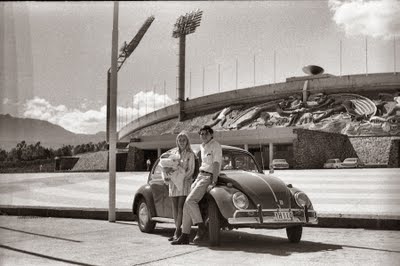 When our first daughter Alexandra Elizabeth was born August 27, 1968 we immediately dubbed her our Olympic baby. We were living in Mexico City at the time. The city and the nation were living with the anticipation and excitement of the Summer Olympics (officially called the Games of the XIX Olympiad) which were to open on October 12th, universally known in Latin America as “el Día de La Raza”. Latin Americans know that for better or for worse, Columbus Day marked the beginning of the mestizo race.
Mexico City was a city of unrest. The Mexican government and its president Gustavo Díaz Ordaz had invested a massive $150 million in preparations for the Olympics, (equal to roughly $7.5 billion dollars by today’s terms) a huge amount considering the poverty that was present then in Mexico. There were student protests all over the country. There were shouts of ¡No queremos olimpiadas, queremos revolución! ("We don't want Olympic Games, we want revolution!"). Finally in September, Ordaz ordered the occupation of the National Autonomous University by the army. In Mexico the often Hollywoodesque concept that a criminal can seek sanctuary in a church really applies to a university. The autonomous part of the name reflects a Mexican university’s traditional independence. They have always guarded this right/privilege. It is sacrosanct in Mexico. The rector of the university Javier Barros Sierra resigned in protest on September 23 when students were beaten and arrested indiscriminately.
When our first daughter Alexandra Elizabeth was born August 27, 1968 we immediately dubbed her our Olympic baby. We were living in Mexico City at the time. The city and the nation were living with the anticipation and excitement of the Summer Olympics (officially called the Games of the XIX Olympiad) which were to open on October 12th, universally known in Latin America as “el Día de La Raza”. Latin Americans know that for better or for worse, Columbus Day marked the beginning of the mestizo race.
Mexico City was a city of unrest. The Mexican government and its president Gustavo Díaz Ordaz had invested a massive $150 million in preparations for the Olympics, (equal to roughly $7.5 billion dollars by today’s terms) a huge amount considering the poverty that was present then in Mexico. There were student protests all over the country. There were shouts of ¡No queremos olimpiadas, queremos revolución! ("We don't want Olympic Games, we want revolution!"). Finally in September, Ordaz ordered the occupation of the National Autonomous University by the army. In Mexico the often Hollywoodesque concept that a criminal can seek sanctuary in a church really applies to a university. The autonomous part of the name reflects a Mexican university’s traditional independence. They have always guarded this right/privilege. It is sacrosanct in Mexico. The rector of the university Javier Barros Sierra resigned in protest on September 23 when students were beaten and arrested indiscriminately.
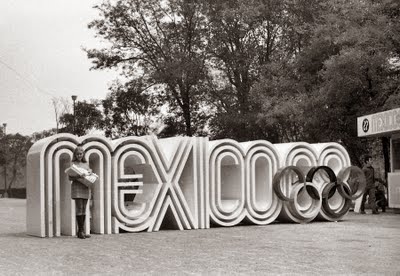 The stage was set for what was called the Tlatelolco Massacre which happened on October 2. At the time there were a few radio stations in Mexico in English that had a direct radio feed from the CBS network in the US. I often listened to the station as I had affection for liberal radio columnist Nicholas Von Hoffman’s corrosive but funny comments (“If you really want to have a kid, adopt a baby goat.”) and Dan Rather's quiet spoken almost gentle Texas accent. CBS radio news was on at the top of every hour. That late afternoon broadcast began something like this, “There have been reports of army shootings at students at the Plaza of Three Cultures (Aztec, Spanish, Mestizo). We take you to our correspondent, live from Tlatelolco in Mexico City, ‘The army has been shooting at students who have gathered here. I see many dead…’
The stage was set for what was called the Tlatelolco Massacre which happened on October 2. At the time there were a few radio stations in Mexico in English that had a direct radio feed from the CBS network in the US. I often listened to the station as I had affection for liberal radio columnist Nicholas Von Hoffman’s corrosive but funny comments (“If you really want to have a kid, adopt a baby goat.”) and Dan Rather's quiet spoken almost gentle Texas accent. CBS radio news was on at the top of every hour. That late afternoon broadcast began something like this, “There have been reports of army shootings at students at the Plaza of Three Cultures (Aztec, Spanish, Mestizo). We take you to our correspondent, live from Tlatelolco in Mexico City, ‘The army has been shooting at students who have gathered here. I see many dead…’
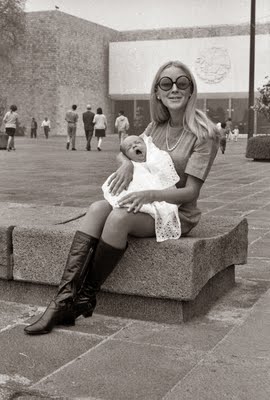 I could hear the gunshots and the shouts. Suddenly I heard a click and an announcer began, “The baseball scores for today are as follows: From the National League…” I switched the dial around and all I could hear was music. The Mexican government censors had taken care of all that after that small lapse in efficiency. It was quite a few years later that subsequent investigations on the massacre determined that snipers of the Presidential Guard had done much of the shooting and that at least 200 students had been killed.
Amidst all this I managed to drive our blue VW beetle to the University where the Estadio Olímpico was being readied for the opening ceremonies. As you can see from the picture here which I must have taken sometime in September, there was no indication of the army or of any activity. It seemed to be dead. But the army was there. I had been stopped by a soldier who told me I could not go any further. I remember teling him that we had an Olympic baby and we wanted to take a picture by the stadium. The soldier laughed and said, "Pase señor." And then he took the picture for us.
I could hear the gunshots and the shouts. Suddenly I heard a click and an announcer began, “The baseball scores for today are as follows: From the National League…” I switched the dial around and all I could hear was music. The Mexican government censors had taken care of all that after that small lapse in efficiency. It was quite a few years later that subsequent investigations on the massacre determined that snipers of the Presidential Guard had done much of the shooting and that at least 200 students had been killed.
Amidst all this I managed to drive our blue VW beetle to the University where the Estadio Olímpico was being readied for the opening ceremonies. As you can see from the picture here which I must have taken sometime in September, there was no indication of the army or of any activity. It seemed to be dead. But the army was there. I had been stopped by a soldier who told me I could not go any further. I remember teling him that we had an Olympic baby and we wanted to take a picture by the stadium. The soldier laughed and said, "Pase señor." And then he took the picture for us.
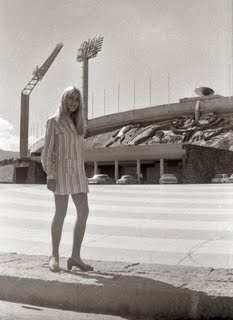 I often hear these days that living through an Olympics is a once-in-a-lifetime experience that one does not forget. I asked Rosemary this morning if she remembered anything. Her answer was a curt, “No.” I remember four events and two more.
I remember the wonderful highway of art that for miles featured beautiful and cutting edge sculpture from all over the world. These sculptures have survived to this day.
I remember going to a Greek play (appropriately performed by a Greek troupe in Greek). It might have been Aristophanes. I am not sure. But I do remember that the play was Greek to me and that every once in a while the actors would utter the word anthropos or nous. These were the only words I recognized.
I often hear these days that living through an Olympics is a once-in-a-lifetime experience that one does not forget. I asked Rosemary this morning if she remembered anything. Her answer was a curt, “No.” I remember four events and two more.
I remember the wonderful highway of art that for miles featured beautiful and cutting edge sculpture from all over the world. These sculptures have survived to this day.
I remember going to a Greek play (appropriately performed by a Greek troupe in Greek). It might have been Aristophanes. I am not sure. But I do remember that the play was Greek to me and that every once in a while the actors would utter the word anthropos or nous. These were the only words I recognized.
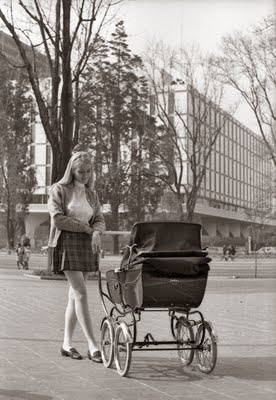 I remember the Magic Lantern a phenomenal theatre production from former Czechoslovakia that mixed acting on stage with projections. The effects were similar to those old Laurel and Hardy films that had the two of them negotiating recklessly their car through intense traffic.
I remember watching (on TV) and being totally amazed by Bob Beamon’s (US) long jump of 8.90 metres (not broken until 1991).
But there were two events that will always live in my memory. One was the Mexican silver medalist Sargento José Pedraza in the 20km walk. While Mexico was able to win 9 medals in all (3 in each category of gold, silver and bronze) it was the win by this quiet and obviously mestizo soldier, ungainly, almost funny as he walked, who captured the hearts of Mexico. His silver medal soon became gold in my memory and only today was I able to correct it. The shy sergeant, left in picture, below) had won big between two Soviet Union behemoths.
I remember the Magic Lantern a phenomenal theatre production from former Czechoslovakia that mixed acting on stage with projections. The effects were similar to those old Laurel and Hardy films that had the two of them negotiating recklessly their car through intense traffic.
I remember watching (on TV) and being totally amazed by Bob Beamon’s (US) long jump of 8.90 metres (not broken until 1991).
But there were two events that will always live in my memory. One was the Mexican silver medalist Sargento José Pedraza in the 20km walk. While Mexico was able to win 9 medals in all (3 in each category of gold, silver and bronze) it was the win by this quiet and obviously mestizo soldier, ungainly, almost funny as he walked, who captured the hearts of Mexico. His silver medal soon became gold in my memory and only today was I able to correct it. The shy sergeant, left in picture, below) had won big between two Soviet Union behemoths.
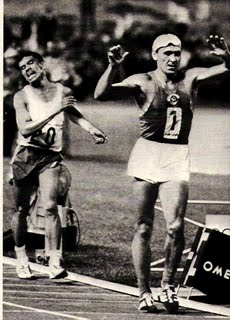 The other moment of note was to watch; American athletes Tommie Smith and John Carlos (first and third place) at the ceremony for the 200m sprint raise their fists in a “Black Panther” salute in protest to racism in America. The TV vision before my eyes was shockingly similar to another in my memory. It was that photograph of Jesse Owens in triumph in the 1938 Berlin Summer Olympics, while the German athlete, a member of the then "superior" race raised his arm in a salute to Hitler and the Japanese athlete quietly minded his own business.
The other moment of note was to watch; American athletes Tommie Smith and John Carlos (first and third place) at the ceremony for the 200m sprint raise their fists in a “Black Panther” salute in protest to racism in America. The TV vision before my eyes was shockingly similar to another in my memory. It was that photograph of Jesse Owens in triumph in the 1938 Berlin Summer Olympics, while the German athlete, a member of the then "superior" race raised his arm in a salute to Hitler and the Japanese athlete quietly minded his own business.
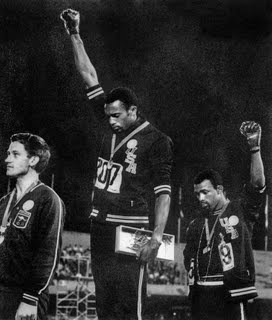 Perhaps at my age and situation I have a good excuse for feeling about the Olympics the way Scrooge felt about Christmas. I might have warmed up a bit to a Summer Olympics but the winter sports leave me literally and figuratively cold. If I had the resources I would be packing for a visit to Mérida in Mexico or Trelew in Patagonia.
Perhaps at my age and situation I have a good excuse for feeling about the Olympics the way Scrooge felt about Christmas. I might have warmed up a bit to a Summer Olympics but the winter sports leave me literally and figuratively cold. If I had the resources I would be packing for a visit to Mérida in Mexico or Trelew in Patagonia.
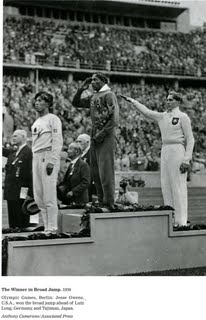 But who knows I just might catch that Olympic spirit yet and those words, ¡No queremos olimpiadas, queremos revolución! will fade away.
As I look at these pictures I get fond memories (My! are Rosemary's legs beautiful!) of what seemed to be the simpler times of my youth. As soon as Ale (Alexandra) had been born, my mother had come to visit us at our little apartment on Calle Estrasburgo in the Zona Rosa. "What you need is an English pram,” She told us. She picked up the English language newspaper The News and said, "Here is one. Let me call." The used English pram was made of finely lacquered (dark blue) wood). Soon after, we paraded our daughter on the elegant Paseo de la Reforma. Behind Rosemary and the pram you can see the bulk of the American Embassy. It was about then that Americans began to prepare for a worldwide siege on their embassies. Sargento Pedraza's win marked, in my opinion, a shift in Mexico. The Mexican soccer teams playing in games abroad where now called los Aztecas or el equipo cobre (the copper coloured team). Sargeant Pedraza's win in what was considered then a laughable sport became a symbol of the true amateur winning in a field of highly paid "amateur" athletes. Sargeant Pedraza's win may have marked the first awareness of the Mexican mestizos that they were indeed equal to any other race. They became proud and la Raza movement exploded into the US.
Indeed, good things can come out of the Olympics.
The conquest of Mexico
Columbus' egg
But who knows I just might catch that Olympic spirit yet and those words, ¡No queremos olimpiadas, queremos revolución! will fade away.
As I look at these pictures I get fond memories (My! are Rosemary's legs beautiful!) of what seemed to be the simpler times of my youth. As soon as Ale (Alexandra) had been born, my mother had come to visit us at our little apartment on Calle Estrasburgo in the Zona Rosa. "What you need is an English pram,” She told us. She picked up the English language newspaper The News and said, "Here is one. Let me call." The used English pram was made of finely lacquered (dark blue) wood). Soon after, we paraded our daughter on the elegant Paseo de la Reforma. Behind Rosemary and the pram you can see the bulk of the American Embassy. It was about then that Americans began to prepare for a worldwide siege on their embassies. Sargento Pedraza's win marked, in my opinion, a shift in Mexico. The Mexican soccer teams playing in games abroad where now called los Aztecas or el equipo cobre (the copper coloured team). Sargeant Pedraza's win in what was considered then a laughable sport became a symbol of the true amateur winning in a field of highly paid "amateur" athletes. Sargeant Pedraza's win may have marked the first awareness of the Mexican mestizos that they were indeed equal to any other race. They became proud and la Raza movement exploded into the US.
Indeed, good things can come out of the Olympics.
The conquest of Mexico
Columbus' egg






